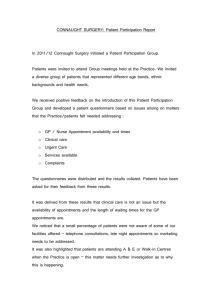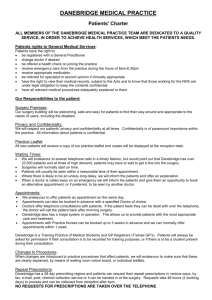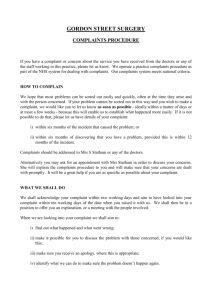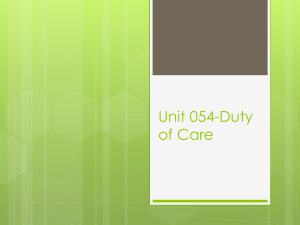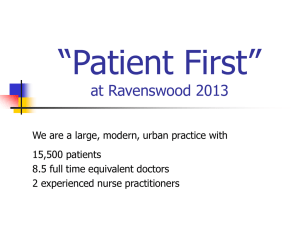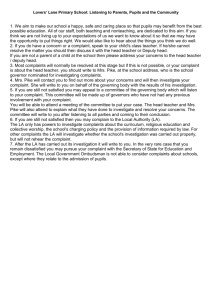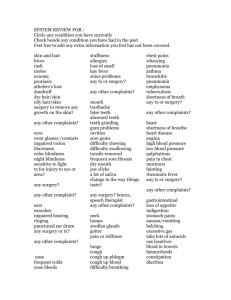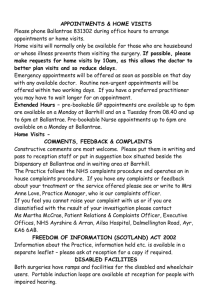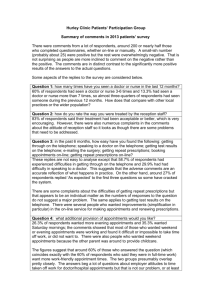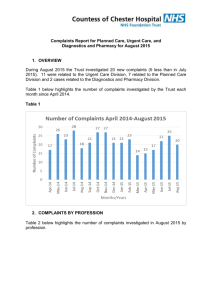Patient Charter - Oakengates Medical Practice
advertisement
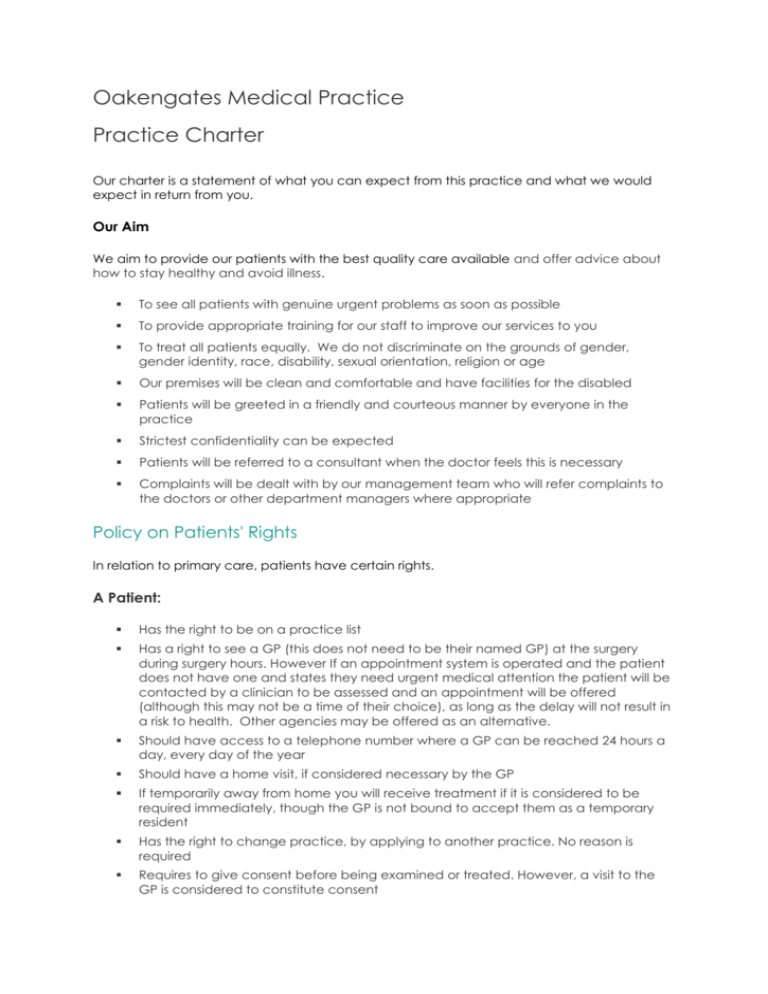
Oakengates Medical Practice Practice Charter Our charter is a statement of what you can expect from this practice and what we would expect in return from you. Our Aim We aim to provide our patients with the best quality care available and offer advice about how to stay healthy and avoid illness. To see all patients with genuine urgent problems as soon as possible To provide appropriate training for our staff to improve our services to you To treat all patients equally. We do not discriminate on the grounds of gender, gender identity, race, disability, sexual orientation, religion or age Our premises will be clean and comfortable and have facilities for the disabled Patients will be greeted in a friendly and courteous manner by everyone in the practice Strictest confidentiality can be expected Patients will be referred to a consultant when the doctor feels this is necessary Complaints will be dealt with by our management team who will refer complaints to the doctors or other department managers where appropriate Policy on Patients' Rights In relation to primary care, patients have certain rights. A Patient: Has the right to be on a practice list Has a right to see a GP (this does not need to be their named GP) at the surgery during surgery hours. However If an appointment system is operated and the patient does not have one and states they need urgent medical attention the patient will be contacted by a clinician to be assessed and an appointment will be offered (although this may not be a time of their choice), as long as the delay will not result in a risk to health. Other agencies may be offered as an alternative. Should have access to a telephone number where a GP can be reached 24 hours a day, every day of the year Should have a home visit, if considered necessary by the GP If temporarily away from home you will receive treatment if it is considered to be required immediately, though the GP is not bound to accept them as a temporary resident Has the right to change practice, by applying to another practice. No reason is required Requires to give consent before being examined or treated. However, a visit to the GP is considered to constitute consent Is entitled to a chaperone during intimate examinations Is not bound legally to accept treatment. However, a doctor can give essential treatment if the patient is temporarily incapable of understanding or consenting to treatment as per the Adults with Incapacity Act May refuse to be examined when a medical student is present Is entitled to a full and truthful answer to questions unless the answers would result in anxiety, which may injure the person’s health Has the right to complain about their GP if he/she has not followed their terms of service or behaves in an unprofessional or unethical way. The patient should then be kept informed about how the complaint is being dealt with and told of the outcome Has the right to see medical reports requested by insurance companies or employers before they are forwarded. However, a GP may withhold them if access may cause harm to the patient or if they contain information regarding a third party Has the right to confidentiality With These Rights Come Responsibilities, We ask you to be patient with the receptionists and remain courteous at all times. They are doing their best and are only following the doctors’ instructions. Who expect: Patients to attend their appointments at the arranged time. If you cannot attend please inform the surgery immediately, as this appointment can be given to someone else who is in need of medical attention and to help reduce waiting times for further appointments. Patients to understand that appointments are for one person only. Additional appointments will need to be made if more than one person needs to be seen To be patient if appointment times are running late as it may be you who needs the extra time on another occasion. Patients to be prepared to make further appointments if they have numerous less urgent problems, as doctors only have 10 minute consultations Patients to be responsible for their own health and the health of their children and should co-operate with the practice in endeavouring to keep themselves healthy Requests for help or advice for non-urgent matters be made during surgery hours Home visits should only be requested for patients who are seriously ill or known to be housebound. It is important to bear in mind that most medical problems are dealt with more effectively in the clinical setting of a well-equipped surgery Patients to understand that home visits are made at the doctor’s discretion Requests for night visits should only be made for emergencies Patients to understand many problems can be solved by advice alone, therefore patients should not always expect a prescription at every consultation Patients to provide the practice plenty of time when requesting medication, 2 working days for repeat prescriptions and 3 working days for other prescription queries. Patients to treat the doctors and staff with courtesy and respect Patients to ensure they inform the practice staff of any alterations in their circumstances, such as change of surname, address or telephone number, even if it is ex-directory The practice operates a Zero Tolerance Policy with regard to violence and abuse. Any patient who is violent or abusive towards a doctor or member of staff will be removed from the practice list with immediate effect in order to safeguard practice staff, patients and other persons. Violence in this context includes actual or threatened physical violence or verbal abuse which leads to fear for a person’s safety. The patient will be informed in writing with an explanation of the reason for removal. Suggestions We welcome comments on the services provided. These should be directed to the practice manager, Mrs Helen Lippitt or her deputy Miss Lucy Hedges. Complaints We always try to provide the best service possible, but there may be times when you feel this has not happened. The following information explains our in-house complaints procedure, drawn up to respond to patient grievances. We hope you will use it to allow us to look into, and, if necessary, correct any problems that you have identified, or mistakes that have been made. Any complaints should be addressed either by telephone or in writing to our practice manager, Mrs Helen Lippitt or the Senior Partner Dr Ellen Nolan. In line with our complaints procedure you should have any complaint acknowledged within 7 days beginning with the day on which the complaint was made or, where that is not possible, as soon as reasonably practicable. We aim to resolve the complaint and reply to you in writing within 14 days. This process may include a meeting between you and the manager and/or doctor. Where a response is not possible within 14 days we will provide you with a weekly update report to the patient with an estimate of the timescale. Most complaints are resolved within our in-house complaints procedure, but should you feel that we have not dealt with your complaint adequately you may seek help from the Patient Advice and Liason Service [PALS] (01952 580407 or twccg.patientservices@nhs.net ) or write to Patient Services Team, NHS Telford and Wrekin CCG, Halesfield 6, Telford, TF7 4BF. Confidentiality and Your Personal Health Information To provide you with the care you need, we hold the details of your consultations, illnesses, tests, prescriptions and other treatments that have been recorded by everyone involved in your care and treatment, e.g. GP, health visitor, practice nurse. This information may be stored on paper or electronically on computer files by practice staff. We sometimes disclose some of your personal health information to other organisations involved in your care. For example, when your GP refers you to a specialist at the hospital we will send relevant details about you in the referral letter and receive information about you from them. Our practice also participates in regional and national programmes such as the cervical cytology screening service and your name and address, date of birth and health number will be given to them in order to send an invitation to you. Sometimes, we may participate in studies that are designed to improve the way services are provided to you or to check that our performance meets required standards and benchmarks. Whenever we take part in activities such as these we will ensure that as far as possible any details that may identify you are not disclosed. We are sometimes involved in health research and the teaching of student nurses, doctors and other health professionals. We will not use or disclose your personal health information for these purposes unless you have been informed beforehand and given your consent for us to do so. Anonymised patient information will also be at local and national level to help the Health Board and Government plan services e.g. for diabetic care. If you do not wish anonymous information about you to be used in such a way, please let us know. When you need a service jointly provided with a local authority we will seek your permission before giving them your details. Sometimes we are required by law to pass on information e.g. the notification of births and deaths and certain diseases or crimes to the government is a legal requirement. Our use of your personal health information is covered by a duty of confidentiality and is regulated by the Data Protection Act. The Data Protection Act gives you a number of rights in relation to how your personal information is used, including a right to access the information we hold about you. Everyone working for the NHS has a legal duty to keep information about you confidential and adheres to a Code of Practice on protecting patient confidentiality. Further information on this can be found at https://www.gov.uk/government/publications/confidentiality-nhscode-of-practice Anyone who receives information from us is also under a legal duty to keep it confidential. If you have any further questions regarding this charter please do not hesitate to contact the surgery.
